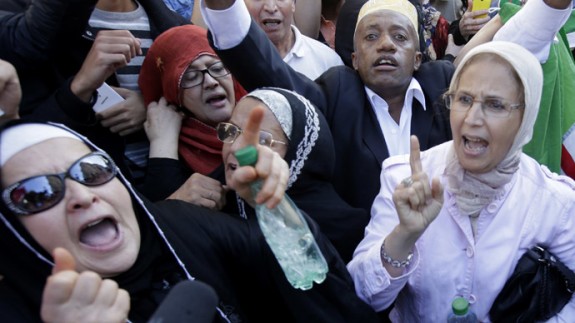Hundreds of Muslims have gathered near the Grand Mosque in Paris to condemn the execution of the French tourist, Herve Gourdel, by Islamic State-linked jihadists and the rise of Islamophobia caused by it.
The demonstrators were holding up placards, reading “”Tribute to Herve Gourdel” and “God is merciful” as well as signs with NotInMyName hastag.
The crowd chanted “Islam for peace,” with French officials and representatives from the Parisian Arab community present at the event.
“We French Muslims say stop to barbarism, stop to terrorism,” Dalil Boubakeur, head of the French Council of the Muslim Faith, said during the rally.He called Friday’s demonstration a “vibrant expression of our desire for national unity and of our unwavering will to live together”.
You can watch a video report below.
Meantime, at One-to-One, the CNEWA blog:
In the past week two important documents have been published from Muslim organizations which respond to the often-heard question: “Why don’t Muslims speak out against what is happening to Christians and other religious minorities in Iraq and Syria?”
The first document, “In the Face of Conflict,” is a statement of principles published on 26 September by King Abdullah bin Abdulaziz International Centre for Interreligious and Intercultural Dialogue in New York. Without mentioning any specific conflict or specific religion or faith traditions, the document condemns violence, terrorism and hate speech. It also condemns what it calls the “instrumentalization of religion to make war.”
A more interesting and more important document appeared 25 September 2014. It is an open letter to “Dr. Irahim Awwad Al-Badri, alias ‘Abu Bakr Al-Baghdadi’” (who is the head of ISIS and self-declared Caliph) and “to the fighters and followers of the self-declared ‘Islamic State’” and it is signed by 126 Sunni leaders from around the world.
The lengthy letter is in the form of a traditional Islamic fetwa or legal decision. Far from being a statement of general principles, the letter deals with concrete events and persons. In the best of Muslim legal tradition, the letter uses principles from the Quaran and from the Sunna—the sayings and acts of the Prophet Muhammad—along with ideas from the great Muslim thinkers and commentators of the past, and from historical events.
At the beginning of this complicated and tightly reasoned letter there is an Executive Summary which contains 24 principles. Although each one is extremely important, some of the most notable and pertinent ones are:
- It is forbidden in Islam to ignore the reality of contemporary times when deriving legal rulings (#5),
- It is forbidden to kill journalists and aid workers (#7).
- It is obligatory to consider Yazidis as People of the Scripture (#11).
- The re-introduction of slavery is forbidden in Islam. It was abolished by universal consensus (#12).
- It is forbidden is Islam to force people to convert (#13).
- It is forbidden in Islam to torture people (#17).
- It is forbidden in Islam to declare a caliphate without consensus from all Muslims (#22).












